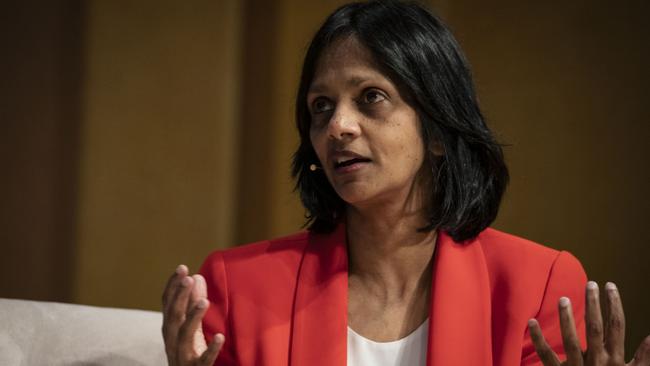Technology central to global recovery: Macquarie CEO
Shemara Wikramanayake says automation will be crucial as signs of inflation emerge and competition for skilled staff heats up.

Business
Don't miss out on the headlines from Business. Followed categories will be added to My News.
Macquarie Group chief executive Shemara Wikramanayake says technology and automation are central to the global economic recovery, particularly as signs of inflation emerge and competition for skilled staff heats up.
She was speaking on the opening day of the online Macquarie Technology Summit, which will delve into areas including digital infrastructure, smart cities, the future of work and financial technology developments.
“Technology is central to the global economic recovery and ensuring the recovery is informed by the experiences of the pandemic period,” Ms Wikramanayake said.
“Automation may well provide an efficiency-driven break on the signs of price inflation as well, that we are starting to see emerge.
“The potential of technology makes economic growth more accessible, more equitable and more sustainable.”
Investor nerves around inflation expectations and the speed of the economic rebound globally from Covid-19, are spurring big swings in financial markets, as markets bet on interest rates increasing earlier than central banks are suggesting.
The summit comes, though, as Macquarie has been in the firing line for its role in the disastrous trading of analytics and software player Nuix, after its ASX listing in late 2020.
While Macquarie booked bumper profits from selling down its holding to 30 per cent, from 70 per cent, in the float, Nuix has subsequently issued several earnings downgrades and flagged it will miss prospectus forecasts.
Regulators are probing the listing process and Nuix’s disclosures following a tumultuous six months for the company, which has also announced the exit of its finance boss and departure by the year’s end of its CEO Rod Vawdrey.
Ms Wikramanayake also used her address at the summit to talk about significant shifts in the global pool for technology talent.
“The deconstruction of borders and ever improving tools of collaboration means that the competitive market for technology talent has never been more global,” she said.
“While more competitive, the talent pool is more diverse as well, with the ability to work flexibly to some extent pioneered over the long term by the technology industry, opening roles to more women and to people based less predictable locations.”
On financial technology, Ms Wikramanayake highlighted that new developments were spurring big shifts in the payments market, banking, borrowing and wealth management.
“Technology is the biggest disrupter and enabler of financial services, with smart entrepreneurs around the world delivering better experiences and tailored solutions for retail customers and for merchants alike,” she said.
Ms Wikramanayake said Macquarie saw a spate of opportunities in the technology sector across areas including data, software, agriculture, biotech, education, health, commodities, climate change, defence, and transport.
“More generally, we’ve also seen some differentiation in performance, favouring companies that have invested in technology navigated the pandemic and captured opportunities arising from it,” she added.
“What’s evident as we look beyond the pandemic is that the world has changed forever.”
Ms Wikramanayake said technology was changing how we live, work and interacted at “a faster pace than any period in human history”, but noted the evolution started before Covid-19 swept the world.
“To say that change has been driven only by necessity as Covid-19 accelerated the adoption of emerging and next generation technologies underplays how quickly the information age was already giving way to the automation age well before the pandemic arose,” she said.
“The extent of change already underway in 2019 already promised to match and surpass the shifts seen in the transition between agricultural, industrial and information societies in previous centuries.
But the pandemic has certainly dictated an unexpected pace of creative disruption which continues to drive us forward. Without doubt in the near term, technology has been central to our ability to respond to Covid-19.”
In another session at the summit, executives talked about the uses for so-called digital twins, which are a virtual representation of an object like a building or bridge, that is updated via real-time data and can draw on machine learning and other tools.
Lendlease digital boss William Ruh said the company had a $100bn pipeline and the group was looking at ways to increase its digitisation efforts.
“What we are trying to do is reduce design complexity, automate more of that design,” he added. “The impact of something like that (digital twin) is incredible.”
Mr Ruh said Lendlease had assessed a development in Singapore to gauge what returns would have been if it had deployed the digital twin technology for that project. “We found that our IRR (internal rate of return) would have gone up 35 per cent,”
The numbers would have been even better when Singapore’s high land values were stripped out, according to Mr Ruh.
Lendlease is also using for the technology in sustainability and energy initiatives, to lower emissions.
“A good example here in Barangaroo is we are taking 1800 litres a month of vegetable oil used in the restaurants, converting it into energy, adding it into our grid and now we’re heating floors to create a new source (of energy),” Mr Ruh said. “In the future every design will be a full digital twin, earlier on.”
Joshua Ridley, CEO and co-founder of Willow, said digital twin technology would “transform real assets”.
“What we saw 20 years ago with the social internet in terms of these big category companies coming through, we are seeing now in terms of the industrial internet,” he added.
He said the barrier to progress in this area of technology was companies sticking with the status quo.
“Complacency is a barrier to adoption of digitisation.”
Originally published as Technology central to global recovery: Macquarie CEO



